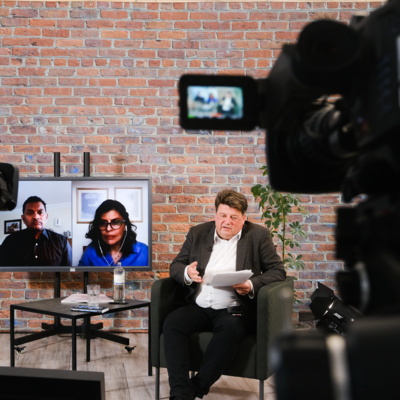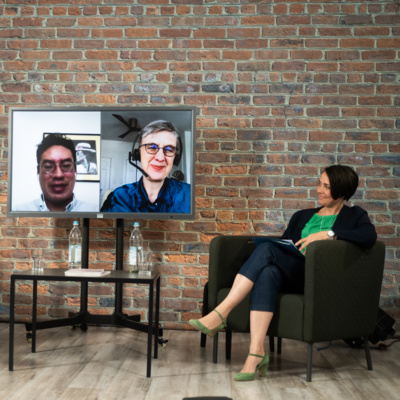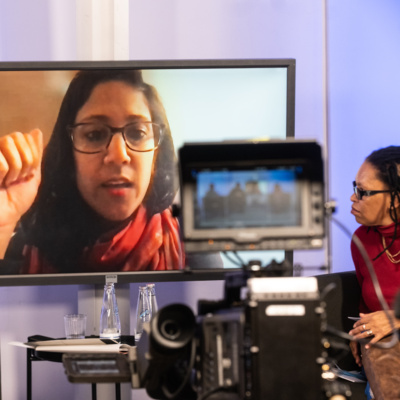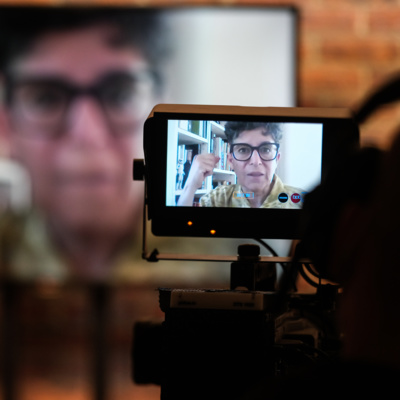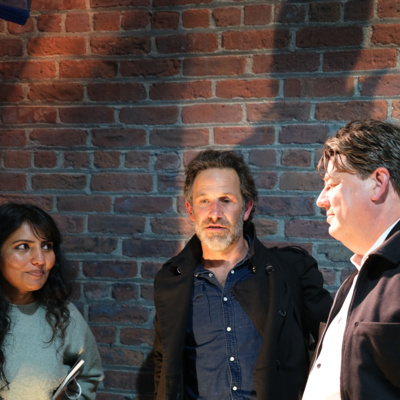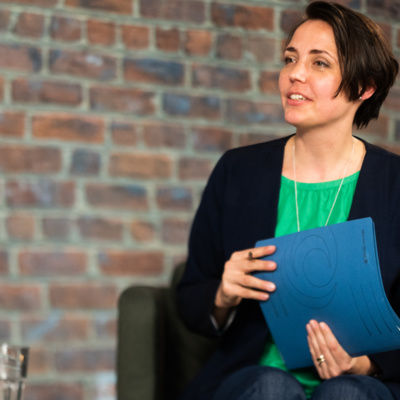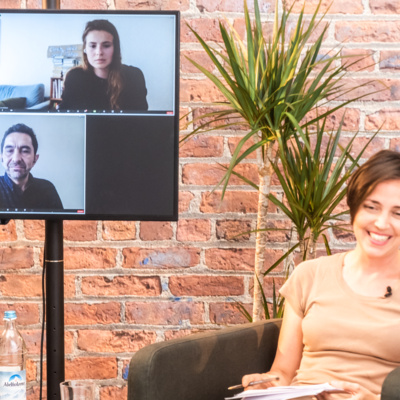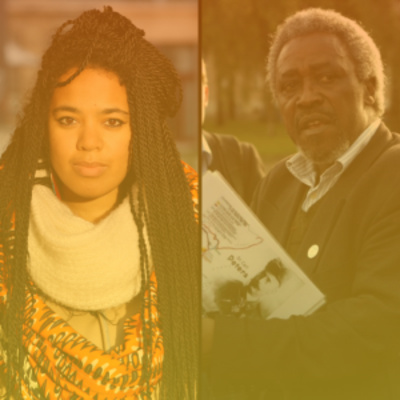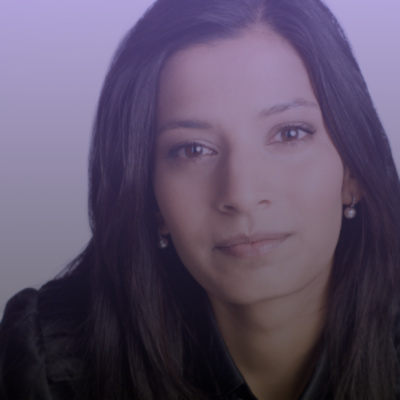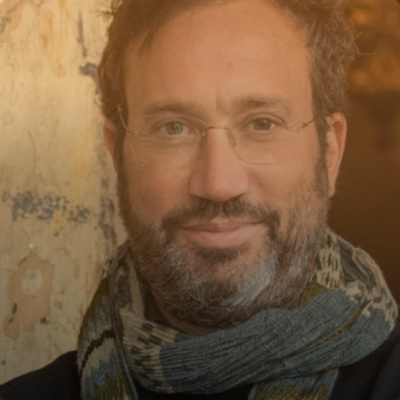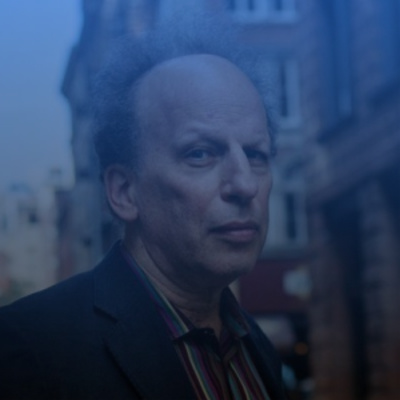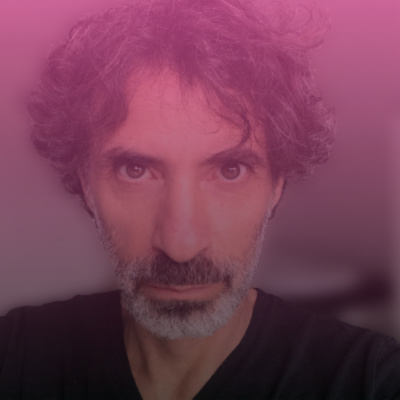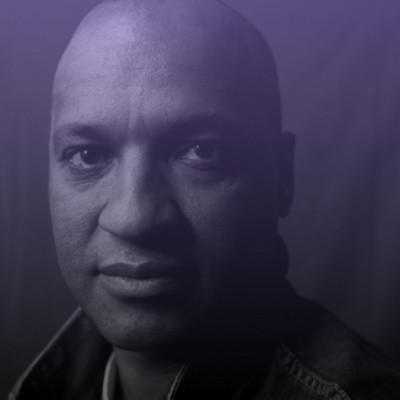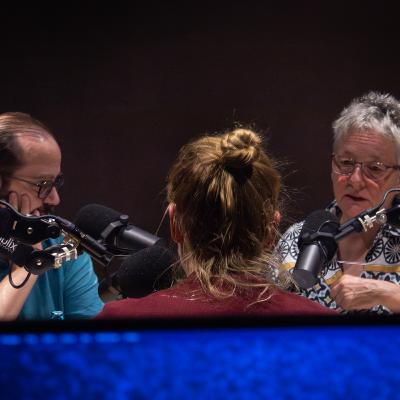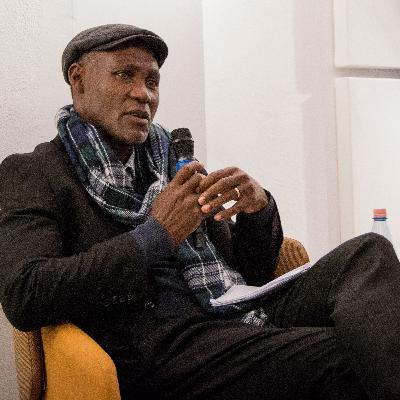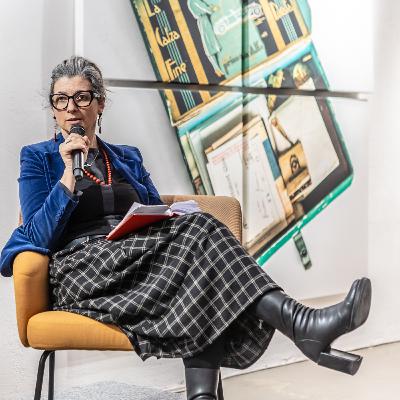Discover Framing Human Rights
Framing Human Rights

Framing Human Rights
Author: ECCHR
Subscribed: 16Played: 80Subscribe
Share
© ECCHR
Description
ECCHR’s podcast about activism, art and justice.
The European Center for Constitutional and Human Rights (ECCHR) is an independent, non-profit legal and educational organization dedicated to enforcing civil and human rights worldwide.
Together with those affected and partners worldwide, ECCHR uses legal means to end impunity for those responsible for torture, war crimes, sexual and gender-based violence, corporate exploitation and fortressed borders.
Find out more here: www.ecchr.eu and in our Living Open Archive: loa.ecchr.eu
The European Center for Constitutional and Human Rights (ECCHR) is an independent, non-profit legal and educational organization dedicated to enforcing civil and human rights worldwide.
Together with those affected and partners worldwide, ECCHR uses legal means to end impunity for those responsible for torture, war crimes, sexual and gender-based violence, corporate exploitation and fortressed borders.
Find out more here: www.ecchr.eu and in our Living Open Archive: loa.ecchr.eu
22 Episodes
Reverse
Human rights in times of crises #1
Welcome to ECCHR’s talk series on resistance and concrete utopias. With our conversations, we want to create the necessary platform for actors from all over the world to discuss and advance global human rights struggles. Human rights are a concrete utopia worth defending. But how to defend them needs to be constantly reinvented. As we find ourselves in a time of profound global transitions, human rights actors need to refer to prevailing inequalities and the underpinning social questions. ECCHR initiated an event series that is now available as a podcast to rethink the struggle for and around human rights.
Alejandra Ancheita (lawyer, founder of ProDESC, Mexico), Joshua Castellino (executive director, Minority Rights Group International), and Wolfgang Kaleck (ECCHR General Secretary) kick off our talk series Human rights in times of crises.
On the basis of Kaleck’s latest book The concrete utopia of human rights: A look back into the future (in German, S. Fischer publishers), our guests discuss how, when faced with a climate crisis, a pandemic, deeply unequal economic models, and authoritarianism, human rights activists can no longer go on with business-as-usual. These unprecedented global transitions are a chance to rethink new strategies and ways forward, and reclaim human rights and their potential for change.
For more information, go to: ecchr.eu/human-rights-in-times-of-crises
Let’s stay in touch! You want to stay up to date on ECCHR’s cases, events and publications? Subscribe to our newsletter.
Human rights in times of crises #2
Law not only organizes and secures economic profits, it is a crucial factor in creating wealth. Katharina Pistor (author, Columbia Law School) speaks with Guillermo Torres (lawyer, ProDESC), Johan Horst (Humboldt-Universität zu Berlin) and Miriam Saage-Maaß (ECCHR program director Business and Human Rights) about how corporate power and law are intertwined.
Our guests explore how economic and financial law are important factors in creating corporate power, and our legal and political options to restrict this dynamic of growing corporate wealth and power. Can human rights, especially economic and social rights, play a role in insuring our societies become more equitable?
Human rights in times of crises is ECCHR’s talk series on resistance and concrete utopias. With our conversations, we want to create the necessary platform for actors from all over the world to discuss and advance global human rights struggles. Human rights are a concrete utopia worth defending. But how to defend them needs to be constantly reinvented. As we find ourselves in a time of profound global transitions, human rights actors need to refer to prevailing inequalities and the underpinning social questions. ECCHR initiated an event series that is now available as a podcast to rethink the struggle for and around human rights.
For more information, go to ecchr.eu/human-rights-in-times-of-crises
Let’s stay in touch! You want to stay up to date on ECCHR’s cases, events and publications? Subscribe to our newsletter.
Human rights in times of crises #7
Colonialism continues to shape our current social, economic, and political world order to a substantial degree. In a discussion with prominent human rights advocates at this last event of our series, we will bridge different aspects of a larger struggle, encompassing reparations claims for German colonial crimes in Namibia, the legacy of slavery, unfinished decolonization, as well as the vibrant Black Lives Matter movement in the United States. How can human rights law be used to resist and counteract (post)colonial injustices? How are these movements broadening and intensifying their connections to human rights work and networks?
In this episode, Sima Luipert (Deputy Chairperson of the Nama Traditional Leaders of Namibia), Vince Warren (Executive Director of the New York-based Center for Constitutional Rights), and Meena Jagannath (Director of Global Programs at Movement Law Lab based in Florida), take part in a conversation moderated by Wolfgang Kaleck (ECCHR General Secretary).
Human rights in times of crises is ECCHR’s talk series on resistance and concrete utopias. With our conversations, we want to create the necessary platform for actors from all over the world to discuss and advance global human rights struggles. Human rights are a concrete utopia worth defending. But how to defend them needs to be constantly reinvented. As we find ourselves in a time of profound global transitions, human rights actors need to refer to prevailing inequalities and the underpinning social questions. ECCHR initiated an event series that is now available as a podcast to rethink the struggle for and around human rights.
For more information, go to: ecchr.eu/human-rights-in-times-of-crises
Let’s stay in touch! You want to stay up to date on ECCHR’s cases, events and publications? Subscribe to our newsletter.
Human rights in times of crises #6
Contemporary feminist movements have developed significantly worldwide in ways that speak to their revolutionary potential – including within authoritarian contexts. How can their theories, political content, and organizational forms – from grassroots collective activism to organized strikes – effectively bring about the political transformation and social change needed in our patriarchal societies? What are their demands and visions for the future? What are the difficulties in realizing these visions? What will sustain – and not limit – the movements’ more radical visions? What is the importance of acknowledging how discrimination is forged at the intersection of gender, race, class, sexual orientation, religion, and more?
In this episode, we are happy to host two highly recommended guests: Marta Dillon is a journalist, writer, lesbian feminist activist, and one of the founders of the #NiUnaMenos grassroots movement in Argentina which campaigns against gender-based of violence. Magdalena Baran-Szoltys is a scholar, co-editor of the book About demands. How feminist activism succeeds, and active in the All-Poland Women’s Strike Movement as well as the protests against the Polish abortion law. The conversation is moderated by Wolfgang Kaleck (ECCHR General Secretary).
Human rights in times of crises is ECCHR’s talk series on resistance and concrete utopias. With our conversations, we want to create the necessary platform for actors from all over the world to discuss and advance global human rights struggles. Human rights are a concrete utopia worth defending. But how to defend them needs to be constantly reinvented. As we find ourselves in a time of profound global transitions, human rights actors need to refer to prevailing inequalities and the underpinning social questions. ECCHR initiated an event series that is now available as a podcast to rethink the struggle for and around human rights.
For more information, go to: ecchr.eu/human-rights-in-times-of-crises
Let’s stay in touch! You want to stay up to date on ECCHR’s cases, events and publications? Subscribe to our newsletter.
Human rights in times of crises #5
From widespread surveillance, torture and disappearances to the increased criminalization of protest and restrictive rules on associations, we are unquestionably witnessing a global pushback against civic spaces. The repressive tactics that seek to strip legitimacy and rights from activists and other civic actors is not just to be deplored in authoritarian countries, but also a very real threat in liberal democracies as well. While the phenomenon of shrinking spaces is certainly not new, the intersectional crises we face – from socio-economic inequality to climate change, the global pandemic, the rise of far-right populism, new technologies and the further concentration of wealth and power into fewer hands – demand that we rethink our approaches and strategies.
In this episode, our guests Ben Hayes, co-author of Rethinking civic space in an age of intersectional crises: A briefing for funders (2020), Isha Khandelwal, a human rights lawyer who can speak to the situation in India and Wolfgang Kaleck (ECCHR General Secretary) discuss concrete visions for organized forms of resistance.
Human rights in times of crises is ECCHR’s talk series on resistance and concrete utopias. With our conversations, we want to create the necessary platform for actors from all over the world to discuss and advance global human rights struggles. Human rights are a concrete utopia worth defending. But how to defend them needs to be constantly reinvented. As we find ourselves in a time of profound global transitions, human rights actors need to refer to prevailing inequalities and the underpinning social questions. ECCHR initiated an event series that is now available as a podcast to rethink the struggle for and around human rights.
For more information, go to: ecchr.eu/human-rights-in-times-of-crises
Let’s stay in touch! You want to stay up to date on ECCHR’s cases, events and publications? Subscribe to our newsletter.
Human rights in times of crises #4
The COVID-19 pandemic has, in unprecedented ways, highlighted the importance of the right to health. The pandemic sharpens the focus on social inequalities between the Global North and the Global South, while the discrepancy between the rich and the poor is also palpable here in Germany: how healthy one is, has much to do with access to wealth.
In this episode, Meena Jagannath (Movement Law Lab), Achal Prabhala (AccessIBSA), Andreas Wulf (medico international) and Miriam Saage-Maaß (ECCHR) discuss what needs to change for medicines and vaccines to no longer be treated as commodities, but instead as common goods. They engage on what role can the global health rights movement play when up against big pharma’s interests.
Human rights in times of crises is ECCHR’s talk series on resistance and concrete utopias. With our talks, we want to create the necessary platform for actors from all over the world to discuss and advance global human rights struggles. Human rights are a concrete utopia worth defending. But how to defend them needs to be constantly reinvented. As we find ourselves in a time of profound global transitions, human rights actors need to refer to prevailing inequalities and the underpinning social questions. ECCHR initiated an event series that is now available as a podcast to rethink the struggle for and around human rights.
For more information, go to: ecchr.eu/human-rights-in-times-of-crises
Let’s stay in touch! You want to stay up to date on ECCHR’s cases, events and publications? Subscribe to our newsletter.
Human rights in times of crises #3
Human rights can help affected communities and others achieve their demands for sustainable climate policies. They can also force governments and businesses to connect environmental concerns and social justice. Do we also need new human rights approaches to do this? What is the relationship between human rights and environmental rights? And who bears the ultimate legal responsibility for the climate crisis?
In this episode, César Rodríguez-Garavito (New York University), Arpitha Kodiveri (European University Institute), Luisa Neubauer (Fridays for Future) and Miriam Saage-Maaß (ECCHR Business and Human Rights program director) talk about human rights’ potential to fight climate change and environmental degradation.
Human rights in times of crises is ECCHR’s talk series on resistance and concrete utopias. With our conversations, we want to create the necessary platform for actors from all over the world to discuss and advance global human rights struggles. Human rights are a concrete utopia worth defending. But how to defend them needs to be constantly reinvented. As we find ourselves in a time of profound global transitions, human rights actors need to refer to prevailing inequalities and the underpinning social questions. ECCHR initiated an event series that is now available as a podcast to rethink the struggle for and around human rights.
For more information, go to: ecchr.eu/human-rights-in-times-of-crises
Let’s stay in touch! You want to stay up to date on ECCHR’s cases, events and publications? Subscribe to our newsletter.
#10 The German colonial period (1884-1920) led and still leads to immense losses of lives, land, resources and sovereignty. To this day, thousands of human remains that were gathered in colonial exploits all over the world can be found in German museums and archives. For many descendants, the continued storage of their ancestors without the consent of the deceased or their families and without proper burial remains a pressing concern.
In this episode, ECCHR’s Michael Bader and Sarah Imani are joined by activist Mnyaka Sururu Mboro (Berlin Postkolonial) and curator and artist Nzé Mboulou Mba Bikoro to discuss the posthumous right to human dignity, the importance of legal restitution, and creating a space for mourning. How can artistic and legal activism support each other in accounting for Germany’s violent colonial history and dismantling enduring structures of colonial oppression?
Read on for more information and the report We want them back by Isabelle Reimann.
Let’s stay in touch! You want to stay up to date on ECCHR’s cases, events and publications? Subscribe to our newsletter.
#9
Writer, activist and ECCHR Advisory Board member Priya Basil sits down with ECCHR General Secretary Wolfgang Kaleck to talk about legacies of colonial and postcolonial injustice and German memory culture. They reflect on the questions: what kinds of power can we find in plurality? Which historical narratives do we give due consideration to? And what are the necessary processes of “sustained unlearning” in the decolonization of knowledge?
Let’s stay in touch! You want to stay up to date on ECCHR’s cases, events and publications? Subscribe to our newsletter.
#8
Eyal Weizman, founding director of research agency Forensic Architecture and ECCHR General Secretary Wolfgang Kaleck speak about the new joint initiative between Forensic Architecture and ECCHR: Investigative Commons. They discuss the advantages of presenting evidence in cultural fora, asking how Forensic Architecture’s approaches and ECCHR’s legal work can be useful to one another and synthesize different methodological approaches.
Let’s stay in touch! You want to stay up to date on ECCHR’s cases, events and publications? Subscribe to our newsletter.
#7
Bénédicte Savoy, Kunsthistorikerin und Professorin an der TU Berlin und dem Collège de France spricht mit ECCHR-Generalsekretär Wolfgang Kaleck über Restitutionen von geraubter Kolonialkunst und ihre Kritik zur Debatte über das Humboldt Forum in Berlin.
Bleiben wir in Kontakt! Sie möchten zu unseren Fällen, Veranstaltungen und Publikationen auf dem Laufenden bleiben? Abonnieren Sie unseren Newsletter.
#1
Fred Ritchin, photographer and dean emeritus of the International Center of Photography, and ECCHR General Secretary Wolfgang Kaleck discuss the role graphic images have in photojournalism to raise political awareness. Looking at iconic historic examples, Ritchin unpacks widely-held ideas about documentary truth, examining how photography can shine light on violence and repression, while also questioning the ways in which this transmission might be limited.
Let’s stay in touch! You want to stay up to date on ECCHR’s cases, events and publications? Subscribe to our newsletter.
#4
This episode is about the debut novel The Blood of the Dawn — La Sangre de la Aurora by Claudia Salazar Jiménez. Salazar Jiménez and Karina Theurer, director of ECCHR’s Institute for Legal Intervention, discuss the enduring consequences of gender discrimination, using fiction as a tool for visibility and for sensitizing us to the suffering of others. Please be advised, this episode contains themes of sexual and gender-based violence that some listeners may find distressing.
Let’s stay in touch! You want to stay up to date on ECCHR’s cases, events and publications? Subscribe to our newsletter.
#2
Lebanese performance and video artist Rabih Mroué speaks with ECCHR General Secretary Wolfgang Kaleck about how he treats the impact of violent images in his work. Beginning with his piece PIXELATED REVOLUTION, which uses the moment of the civilian witness capturing violence on their cellphone camera, Mroué lays out a complicated web of connections between the witnessing acts of viewer, victim, and perpetrator.
Let’s stay in touch! You want to stay up to date on ECCHR’s cases, events and publications? Subscribe to our newsletter.
#5
In this episode, curator and cultural historian Mark Sealy and Wolfgang Kaleck, ECCHR general secretary, talk about the challenges of visual representation. They discuss the visuals of violence and the viewers’ responsibility and interrogate different ways of dealing with photography produced in colonial and postcolonial contexts. Sealy and Kaleck thereby try to answer the question: How do we deploy these images… and to what purpose?
Let’s stay in touch! You want to stay up to date on ECCHR’s cases, events and publications? Subscribe to our newsletter.
#3
In this episode, we will look at several of Forensic Architecture’s investigations and working methodologies in Gaza, Germany, and Cameroon with architect and former deputy director of Forensic Architecture, Christina Varvia, and ECCHR General Secretary Wolfgang Kaleck. For the interactive experience visit: explore.ecchr.eu
#6
Guatemalan visual artist Ixmucané Aguilar joins Wolfgang Kaleck, ECCHR general secretary, to discuss her documentary photography practice exploring the enduring effects of German colonialism in Namibia and the genocide against the Herero and Nama. The conversation addresses the fragility of photography as a medium, the risk the photographer runs of imposing their values upon their subject, the importance of collective evidence and recognizing the many nuances of truth. For the interactive experience visit: explore.ecchr.eu
Drohnen und Künstliche Intelligenz sind aus modernen Kriegen kaum noch wegzudenken. Seit 2001 gehört die permanente Angst vor US-Drohnenangriffen zum Alltag vieler Menschen in Afghanistan oder im Jemen. Im Gazastreifen wird KI in großem Umfang für Luftangriffe, die Überwachung der Bevölkerung und das Aufspüren möglicher Ziele eingesetzt. Auch in der Ukraine beeinflusst die massenhafte Produktion kommerzieller Drohnen, die kostengünstig gegen klassische Militärtechnologie eingesetzt werden, maßgeblich den Kriegsverlauf. Der Einsatz von KI und Drohnentechnologie verändert grundlegend, wie Kriege geführt werden – und stellt die bisherige Vorherrschaft konventioneller militärischer Macht zunehmend infrage. Die Tötungsmaschinerie wird dabei von riesigen Datenmengen und deren automatisierter Auswertung angetrieben. Doch wer trägt Verantwortung für gezielte Tötungen, wenn letztlich eine Maschine oder ein Algorithmus über Leben und Tod entscheidet? Wie lässt sich der Einsatz von KI im Einklang mit Menschenrechten und dem Völkerrecht regulieren? Und vor allem: Welche Rechte und Handlungsmöglichkeiten haben die Betroffenen? Im Gespräch mit Anne Schroeter (ECCHR) sind Jutta Weber (Wissenschafts- und Technikforscherin, Philosophin, Medienwissenschaftlerin sowie Professorin für Mediensoziologie an der Universität Paderborn, Leiterin des Forschungsverbunds MEHUCO) und Andreas Schüller (Programmleiter des Bereichs Völkerstraftaten und rechtliche Verantwortung beim ECCHR, wo er u.a. Betroffene US-amerikanischer Drohnenangriffe unterstützt). Quellen in dieser Folge genannter Berichte: Yuval Abraham: ‘Lavender’: The AI machine directing Israel’s bombing spree in Gaza Future of Life Institute: Slaughterbots Future of Life Institute: Slaughterbots – if human: kill() Marc Santora, Lara Jakes, Andrew E. Kramer, Marco Hernandez and Liubov Sholudko: A Thousand Snipers in the Sky: The New War in Ukraine Human Rights Watch: A Hazard to Human Rights: Autonomous Weapons Systems and Digital Decision-Making ECCHR: Ramstein vor Gericht: Deutschlands Rolle bei US-Drohnenangriffen im Jemen
We have been raised and operate in an environment in which narrations on “migration” and “migrants” are intrinsically racist and colonial. The terms themselves attempt to eclipse and decontextualise Global South mobility within a deeply imbalanced and exploitative postcolonial global system. This allows policymakers to target racialized people by making their movement, stay and activities irregular through reforms focused on excluding them from legality. Public acceptance of these policies is enabled by an often-non-critical media discourse which further dehumanizes migrants”. These othering narratives run deep and without actively seeking to identify and deconstruct them, they will be reproduced even by those acting for the interest of “migrants”. In these circumstances, can we ever talk of “migrants” and “migration” without perpetuating racism and colonialism? How much do narratives matter in efforts for social justice?In this episode, listen to the live recording of an evening event hosted by Hanaa Hakiki from ECCHR’s Border Justice team as she is joined by guests to explore how deeply narratives on migration are still trapped in racism and colonialism. Together they discuss knowledge and narrative formation, the pseudo-science of constructed identities and categories, as well as the aliveness of colonization coupled with collective amnesia. Thinking beyond the present, the guests talk about the power of reimagining new futures, of reclaiming language and celebrating amazing human connections. Hanaa’s guests are Aghogho Akpome, Musa Okwonga and Sandra Alloush. Aghogho is a narratives specialist and associate professor from the University of Zululand. Through his project, “The refugee ‘crisis’ and European re-imaginings of Africa”, he has analysed the portrayal of black African refugees by authors, filmmakers and playwrights. Musa is a widely published journalist, the author of a number of books including, “In the End It was All About Love” and he hosts a very popular football podcast and Sandra is a Syrian refugee journalist and documentary filmmaker and vice chair of the European Network Against Racism.
Listen to the United Nations Special Rapporteur on the situation of human rights in the Palestinian Territory occupied since 1967. Francesca speaks about her mandate in the context of the ongoing genocide in Gaza, and the increasing threat to the international legal order. She also shares her experiences of repression and human rights violations she witnessed during her visit to Germany in February 2025.In conversation with Francesca Albanese are Fiona Thorp, Legal Fellow in the Palestine Team at ECCHR, and Chantal Meloni, Senior Legal Advisor in the International Crimes and Accountability program. ECCHR has worked on cases relating to crimes committed by Israeli forces against Palestinian civilians for over a decade. Recently, ECCHR has filed several requests for provisional measures against German exports of weapons of war and other military equipment to Israel, which are used in attacks on the Palestinian population in Gaza. We have also compiled a detailed Q&A on the topic of genocide in Gaza and on the arrest warrants against Israeli Minister Benjamin Netanyahu and former-Israeli Defense Minister Yoav Gallant.Let’s stay in touch! You want to stay up to date on ECCHR’s cases, events and publications? Subscribe to our newsletter.Or support our work with your donation! image © Laura Fiorio


